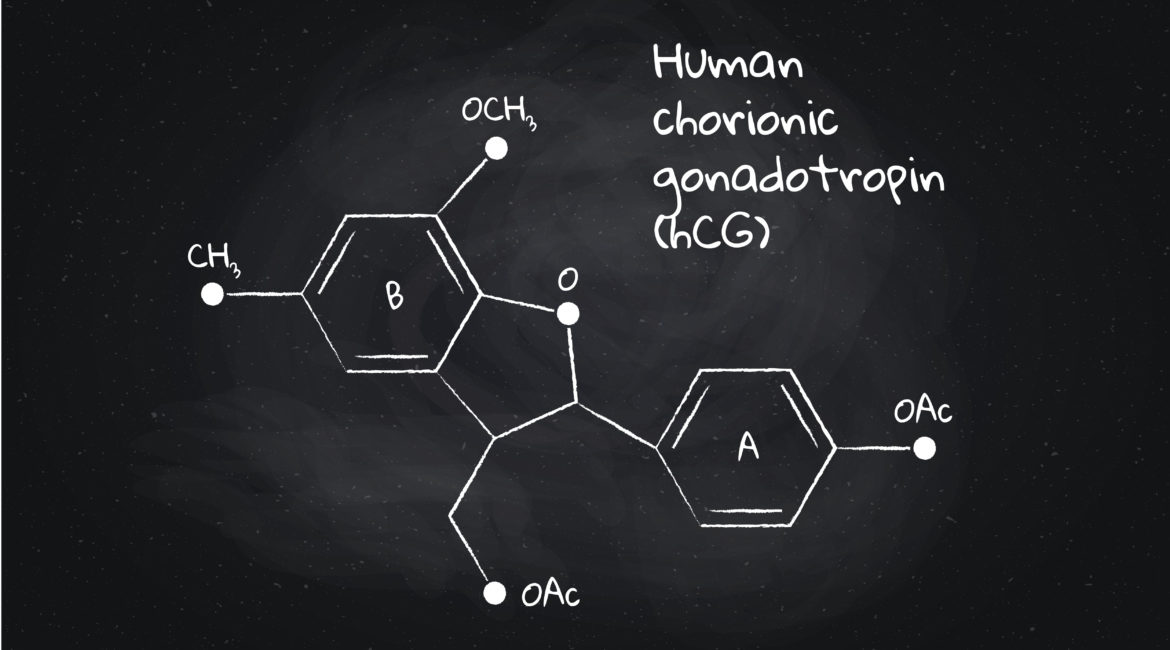Human Chorionic Gonadotropin(HCG) is an FDA-approved treatment that’s used in the treatment of certain conditions in both men and women. It is termed the pregnancy hormone due to the role it plays in pregnant women. So in women, the medication is used to help maintain pregnancy while it caters to hypogonadism and increasing sperm production in men.
Medical experts use HCG in conjunction with other testosterone medications for better results with sexual health and fertility. Even when used on its own, HCG is an effective and safe alternative for TRT.
In summary, here is the bottom line on HCG monotherapy:
HCG monotherapy is a good way to boost your testosterone and even restore lost testosterone levels. However, it’s been found that its effects are not always long-lasting, and some of its best effects for increasing testosterone, are usually don’t by running in tandem with testosterone injections.
What is HCG Monotherapy?
Monotherapy is the use of a single type of drug or treatment to cater to a particular ailment. So using HCG to solely treat a disorder like hypogonadism can be termed HCG Monotherapy. The reasons as to why a doctor might opt for monotherapy instead of a combination of treatments might come as a result of several reasons. The most common one is fertility.
Traditionally the go-to mode of treatment was Testosterone therapy so several doctors are skeptical when it comes to using HCG monotherapy. However, the popularity of the treatment is gaining traction. HCG has a similar nature to LH but slightly differs in the chemical structure. HCG is more potent and its effects last longer in the body approximately 2 days while LH lasts for only a few minutes.
The dosage of HCG is administered daily to optimum levels within the blood. The medication is mostly used to improve low testosterone by treating hypogonadism. HCG imitates Luteinizing hormone(LH) and stimulates the Leydig cells which are present in the gonads. The Leydig cells are responsible for the production of testosterone.
What Does It Do?
Testosterone deficiency mostly comes as a result of either hypogonadism(testicular issues) or brain issues. In uncommon cases, it might be caused by high levels of estrogen in the system which might affect the production of LH. LH is responsible for the stimulation of Leydig cells which are produced at the testicles in order to help in the production of Testosterone.
Apart from testosterone synthesis Luteinizing hormone is also utilized in the development of sperms. With the stimulation of the testicles to produce both testosterone and sperms they ultimately increase in size.
HCG, when introduced to the body, works similarly to LH. It not only acts as LH, but also ensures that the testicles are functioning at a normal physiological level. This shows that not only does HCG help fix a deficiency in testosterone but it also helps with fertility.
Benefits
When used with the utmost care and guidance HCG proves to be one of the best treatments. There are several reasons why a physician opts to use HCG in treating a condition. Whatever the reason you might be in need for the treatment, here are some of the benefits associated with the drug.
Caters to Hypogonadism
The most prevalent symptoms of hypogonadism are infertility and low testosterone. By stimulating the testicular cells HCG helps in increasing sperm count while improving testosterone levels.
Improves Testosterone production
HCG can either be used as a monotherapy or can be combined with other treatments to help restore testosterone in the body. Anyone who has levels below 300 ng/dL is medically considered to have low testosterone. Other signs of testosterone deficiency might include weariness, irritability, diminishing libido and gloominess.
Improved Sexual Responses
Testosterone treatment might help stimulate the sexual desires of some patients. When the hormone is introduced into the body, it helps to reduce the chances of erectile dysfunction while increasing libido. HCG can be introduced to the system to help in improving sexual viability.
Counteracts Steroids Side Effects
Weight lifters are culprits of taking anabolic steroids that have adverse effects on the body. Most of the steroid treatments in the market tend to affect fertility and reduce libido. Fortunately, HCG treatment counters the effects of steroids.
Help in The Dropping of Testicles
In some cases, during adolescence, the testicles might fail to descend. It might be caused by various reasons but experts have tied it to low levels of testosterone and pituitary gland malfunctions.
Improved Testicular Size
The improvement of testicle size comes as a result of the improvement in the production of sperms. HCG maintains the activities of the testicles throughout testosterone treatment which ensures that they regain their size. It’s documented that some patients might also get a slight increase in penile girth and length.
Increased Stamina and Energy
This is usually experienced as a by-product of improved testosterone production. Once the levels of testosterone go up, your mood and energy are directly affected, making you feel re-energized. Doctors advise patients to use this opportunity to get into active routines like workouts and sports.
Maintain Natural Production Of Testosterone
Testosterone therapy might end up affecting how your body naturally produces testosterone. It might cause the atrophy of the pituitary gland and this affects the production of LH. By introducing HCG into your TRT, it helps maintain the functioning of both the pituitary and testes, thus maintaining the natural production of testosterone.
Clinicians tend to market some form of HCG as a means of losing weight while in reality, it is not the intended use of the drug. FDA has not approved the usage of HCG as an over the counter drug for weight loss.
In addition, HCG should not be prescribed to individuals that suffer from certain cancers like prostate and brain cancer. A proper examination needs to be conducted before going through with the treatment.
HCG Therapy Vs Testosterone Therapy
While both therapies work similarly in terms of the improvement of testosterone levels, there is a significant parity when scientifically dissected. HCG works by stimulating the male sexual organs into the production of sperms which translates into the production of testosterone while testosterone therapy works by introducing a synthetic form of testosterone directly into the body.
For any treatment to be regarded as TRT it needs to cater to hormone replacement while maintaining normal body function. Testosterone monotherapy, to some extent fails to meet this criterion.
Even though the results of Testosterone treatment are evident the side effects can be seen as catastrophic. It not only decreases both penis and testicle size but also causes infertility in several patients. Clinicians tend to overlook the importance of maintaining normal physiological levels and functions of the testicles while treating testosterone deficiency.
Naturally, the synthesis of hormones shouldn’t be overlooked as this might cause certain parts of the body to atrophy. HCG when used solely or together with testosterone therapy ensures the improvement of the entire system.
HCG Therapy for TRT vs Testosterone Therapy for TRT
Testosterone therapy for TRT is the most effective treatment for low testosterone but it might not be fit for all patients. Opting for HCG monotherapy is usually the next best option for these types of situations. For quite some time testosterone therapy was solely used but it had some devastating results on patients. It was considered as a form of male contraceptive for its ability to affect fertility levels.
The main difference between the two treatments is that testosterone therapy works by administering testosterone into the body. HCG therapy on the other hand mimics the Luteinizing hormone which stimulates the testicles in producing sperms and testosterone. HCG ensures that the body regains its mechanism of testosterone production.
The two methods of treatment are geared towards different results apart from only treatment hypogonadism. For individuals seeking to become fertile then HCG works best in improving your sperm count. Testosterone therapy works best for individuals that need to lose fat and build muscles.
Doctors might opt for one over the other depending on the severity of hypogonadism. Some patients might have shown symptoms of the disorder while having normal levels of testosterone 300 ng/dL. In this case, HCG is usually the go-to therapy as it caters to hypogonadism without causing high testosterone levels. Meanwhile, testosterone therapy is administered to patients that have extremely low levels of testosterone.
However, there are some men whose systems can’t tolerate HCG. Reasons for this might differ but more studies are being conducted for better understanding. Apart from that, there are slight side effects associated with HCG that might be similar to testosterone treatment. They include:
- The growth of male breasts
- Redness, irritation and swelling at the point of administration
- Abdominal aches
- Nausea and vomiting
In some rare cases will HCG cause some form of blood clots or extreme edemas to the patient. This might be brought about by some underlying issues or some form of allergic reaction to the medication.
HCG with TRT
The two treatments are aimed at improving testosterone levels within males. However, doctors tend to use them together for the best results.
HCG is primarily used once an individual has been placed under testosterone replacement therapy. Anytime a patient is on Testosterone therapy, no matter the dosage, the body senses the introduction of the hormone and it reacts by decreasing its production. This is quite common and shouldn’t cause an alarm. The body seeks to create a balance.
While on testosterone the body stops stimulating the testes and the pituitary glands. They become dormant and go into hibernation. As a result, the testicles can shrink atrophy and shrink in size. HCG is introduced to mitigate these effects.
HCG mimics the functionality of LH by stimulating the cells of the testes thus making them active. This ensures the continued natural production of testosterone giving a boost to the dosage at work. HCG, therefore, helps in preventing or reversing the shrinkage of the testes.
Eventually, some patients might stop using testosterone treatment due to various reasons. However, HCG makes the transition a little better. Due to how active the testicles were, once the patient is off testosterone treatment, their bodies can continue the production of the hormone.
Another issue that is affected by testosterone therapy is fertility. When you are on testosterone placement it takes a toll on your fertility. It’s usually lower compared to when you are off the treatment. Studies have shown that being on HCG assists in increasing your sperm count while on testosterone therapy. When the two treatments work side by side they not only help with the testosterone levels but also improve the health of the testicles resulting in better fertility.
How They Work Together
The proof these two treatments work splendidly together is undoubted. There are several studies to support this.
Here are some of the conclusions that some researchers have shown;
- The combination of testosterone and HCG helps patients maintain balance in the production of their testosterone while under testosterone medication. This has made it possible to maintain testicular health throughout the treatment.
- With older patients suffering from a certain level of hypogonadism, HCG works best in increasing testosterone levels but does not help in improving underlying issues related to erectile dysfunction.
- Low sperm count had been a side effect tethered to testosterone treatment. But it is no longer an issue of dire concern as HCG makes it possible for adequate production of sperms.
- Whether HCG is used for monotherapy or used in conjunction with Testosterone treatment, it helps men with hypogonadism regain the production of sperms. In turn, it enhances their fertility.
- Some patients might have a normal level of testosterone but still suffer from hypogonadism. The use of HCG has shown no signs of causing harm to the patients while treating the disorder.
Bottom Line
In terms of hormone therapy, all hormones in the body work differently, but they all interact either directly or indirectly to maintain body function. Testosterone replacement therapy aims at helping the bodywork best. HCG ensures the normal physiological range is achieved within the gonads and the pituitary gland.
HCG is as effective as how it is administered. It should only be taken under the clear supervision of a trained physician and should be used to treat certain ailments. OTC medication shouldn’t be a go-to option in getting HCG. In men, it can be used as an alternative to testosterone treatment but several doctors are using them side by side for better results and to maintain optimum sexual function.
Patients and doctors always hope for the best results when undergoing treatment. When you work with us, our team of seasoned medical experts will help you find the best anti-aging clinic at no extra charge.




